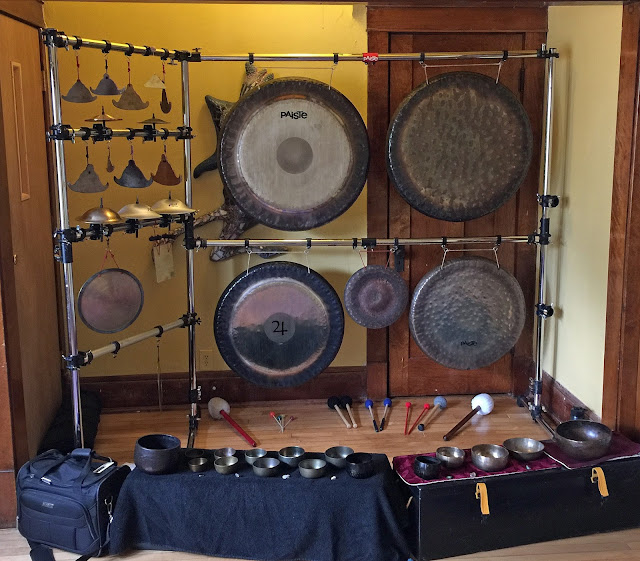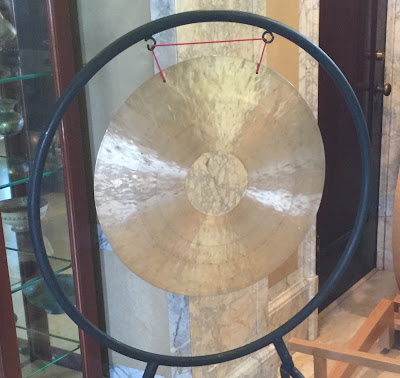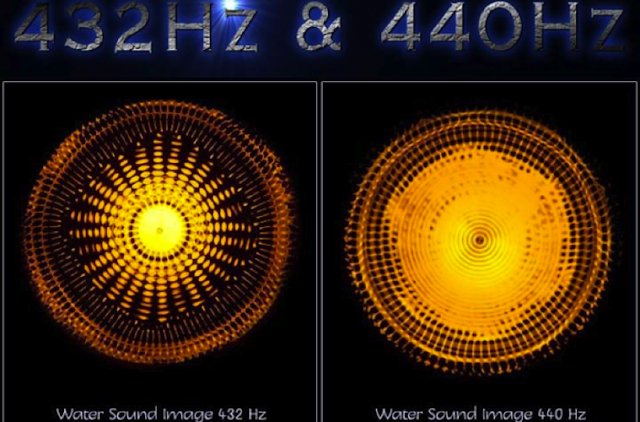The Importance of Pitch Awareness
I play my Gongs/Bowls/Bells in various musical situations. I do Meditation Sessions, solo concerts, and I also work in improvisational groups. In all situations, I have found it extremely important to know the sounds/pitches that my instruments can create, and to know how to produce those sounds/pitches whenever I want/need them.
For the most part, none of my instruments are tuned to specific notes of the western 12-note scale. That is to say, to notes based on an A=440 or 442 tuning. But this doesn't mean that I don't have notes/pitches, as all of my instruments are capable of producing specific notes. It's just that those notes might be flat or sharp from Western tuning, or they may be right on.
For most musicians, learning your notes and how to produce them is an easy thing. The piano has 88 keys all laid out in order and is easily learned as to which key produces which note. The same for a guitar's strings and frets. You can easily learn the fingerings for woodwinds or brass instruments, knowing that if you push down a certain combination of keys, you get the same note every time.
If you play mallet percussion, it's laid out just like a piano. Hit a 'c' bar, and you get a 'c' note every time. But playing a wide variety of Gongs/Bowls/Bells is another thing entirely. Many of the instruments are capable of producing various fundamental notes, as well as a myriad of overtones. Different mallets/strikers, and striking the instruments in different places, multiplies the possibilities of notes available.
Even one large Gong is capable of producing an orchestra of sounds. But you really have to know your instrument to be able to bring these sounds out at will. A good example of this is a recent trio recording session I put together. The trio consisted of female voice, upright bass, and percussion. There were various songs were I specifically was matching the pitch of what someone else was playing, or playing a harmony part.
On one piece, the vocalist, Joni Clare, started singing a repeating wordless melodic line. I picked up on this with a friction mallet/flumi on a large Gong and was able to repeatedly match the notes she was singing. Was this a lucky accident? Not at all. I have spent a lot of time playing with, and working with my instruments. I know them inside and out. I also know my various mallets well, and know where to strike, or rub, a given instrument to bring out a certain notes. I also know how much pressure to apply to bring out that note. There are many other examples where I would play the right bell or bowl to match what was going on harmonically at the time.
A great thing about both Joni, and bassist Barry Paul Clark, is that they are both very pitch aware. There were many times when they would pick up on the pitches I played and either match them or find harmonies to match. And all three of us were always listening and being very aware of what was happening musically. The entire recording session was improvised live, with no overdubs.
Was this just an accident? Not at all. But rather than thinking, “I'll play G# here,” it's a much more intuitive thing for me where I listen and then reach for the right mallet and instrument. But this comes from a lot of hard work over many years. And each time I add a new instrument, I need to work with it to learn what sounds it's capable of and, how to bring out those sounds.
So how does that matter when I'm presenting a Meditation Session, or playing a solo concert? It matters just as much, because I'm always thinking of melody and harmony. I'm always looking for the right sound that will go with the last sound I played, and also go with the next sound I play. Nothing I do is haphazard or by accident. Even though when I improvise, I'm not working from a score, I'm always looking to make connections between the notes I play.
In all the work I do, I'm always thinking of the music as a whole, not just individual notes. I want the first note I play to have a connection to the last note I play. I really think this is an important aspect everyone should reach for. But it takes work. Lots of work. It also takes developing your ear. You need to be able to identify other sounds before you can hope to match them.
For the most part, none of my instruments are tuned to specific notes of the western 12-note scale. That is to say, to notes based on an A=440 or 442 tuning. But this doesn't mean that I don't have notes/pitches, as all of my instruments are capable of producing specific notes. It's just that those notes might be flat or sharp from Western tuning, or they may be right on.
For most musicians, learning your notes and how to produce them is an easy thing. The piano has 88 keys all laid out in order and is easily learned as to which key produces which note. The same for a guitar's strings and frets. You can easily learn the fingerings for woodwinds or brass instruments, knowing that if you push down a certain combination of keys, you get the same note every time.
If you play mallet percussion, it's laid out just like a piano. Hit a 'c' bar, and you get a 'c' note every time. But playing a wide variety of Gongs/Bowls/Bells is another thing entirely. Many of the instruments are capable of producing various fundamental notes, as well as a myriad of overtones. Different mallets/strikers, and striking the instruments in different places, multiplies the possibilities of notes available.
Even one large Gong is capable of producing an orchestra of sounds. But you really have to know your instrument to be able to bring these sounds out at will. A good example of this is a recent trio recording session I put together. The trio consisted of female voice, upright bass, and percussion. There were various songs were I specifically was matching the pitch of what someone else was playing, or playing a harmony part.
On one piece, the vocalist, Joni Clare, started singing a repeating wordless melodic line. I picked up on this with a friction mallet/flumi on a large Gong and was able to repeatedly match the notes she was singing. Was this a lucky accident? Not at all. I have spent a lot of time playing with, and working with my instruments. I know them inside and out. I also know my various mallets well, and know where to strike, or rub, a given instrument to bring out a certain notes. I also know how much pressure to apply to bring out that note. There are many other examples where I would play the right bell or bowl to match what was going on harmonically at the time.
A great thing about both Joni, and bassist Barry Paul Clark, is that they are both very pitch aware. There were many times when they would pick up on the pitches I played and either match them or find harmonies to match. And all three of us were always listening and being very aware of what was happening musically. The entire recording session was improvised live, with no overdubs.
A 2 minute excerpt demonstrating voice (with a looper),
bass, and Gong matching pitches and harmonies.
Joni Clare - voice, Barry Paul Clark - Bass, Michael Bettine - Gong.
Was this just an accident? Not at all. But rather than thinking, “I'll play G# here,” it's a much more intuitive thing for me where I listen and then reach for the right mallet and instrument. But this comes from a lot of hard work over many years. And each time I add a new instrument, I need to work with it to learn what sounds it's capable of and, how to bring out those sounds.
So how does that matter when I'm presenting a Meditation Session, or playing a solo concert? It matters just as much, because I'm always thinking of melody and harmony. I'm always looking for the right sound that will go with the last sound I played, and also go with the next sound I play. Nothing I do is haphazard or by accident. Even though when I improvise, I'm not working from a score, I'm always looking to make connections between the notes I play.
In all the work I do, I'm always thinking of the music as a whole, not just individual notes. I want the first note I play to have a connection to the last note I play. I really think this is an important aspect everyone should reach for. But it takes work. Lots of work. It also takes developing your ear. You need to be able to identify other sounds before you can hope to match them.
~ MB
Chop Wood | Carry Water | Play Gongs



Comments
Post a Comment